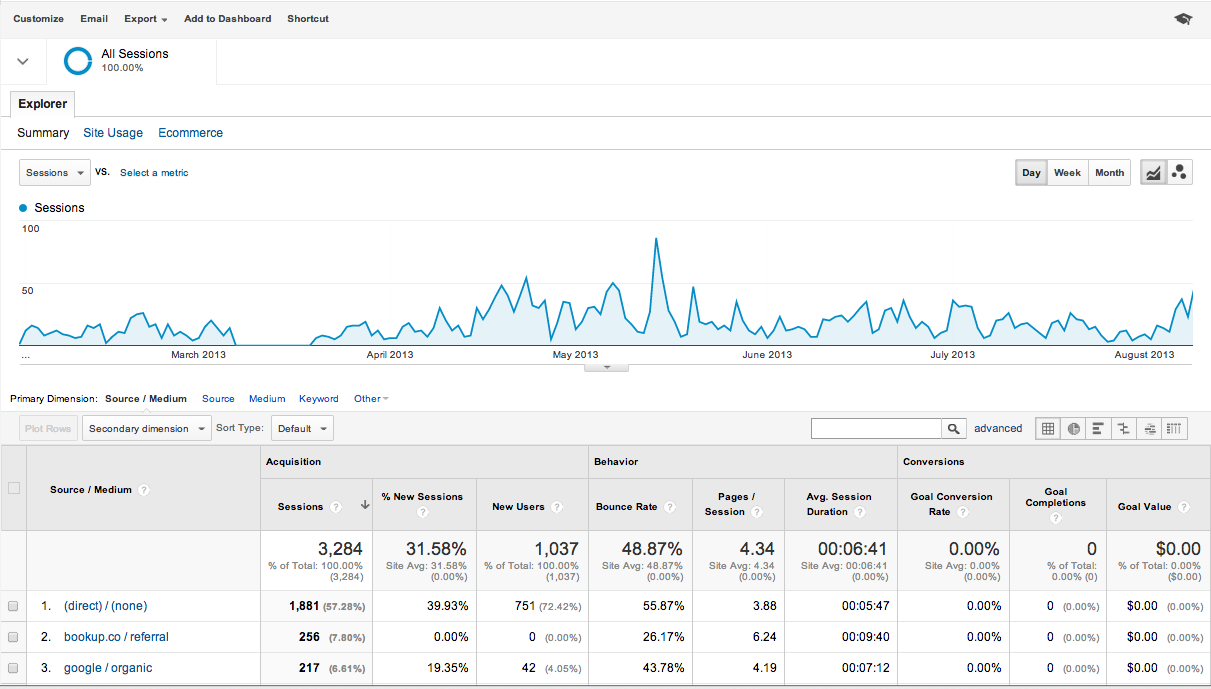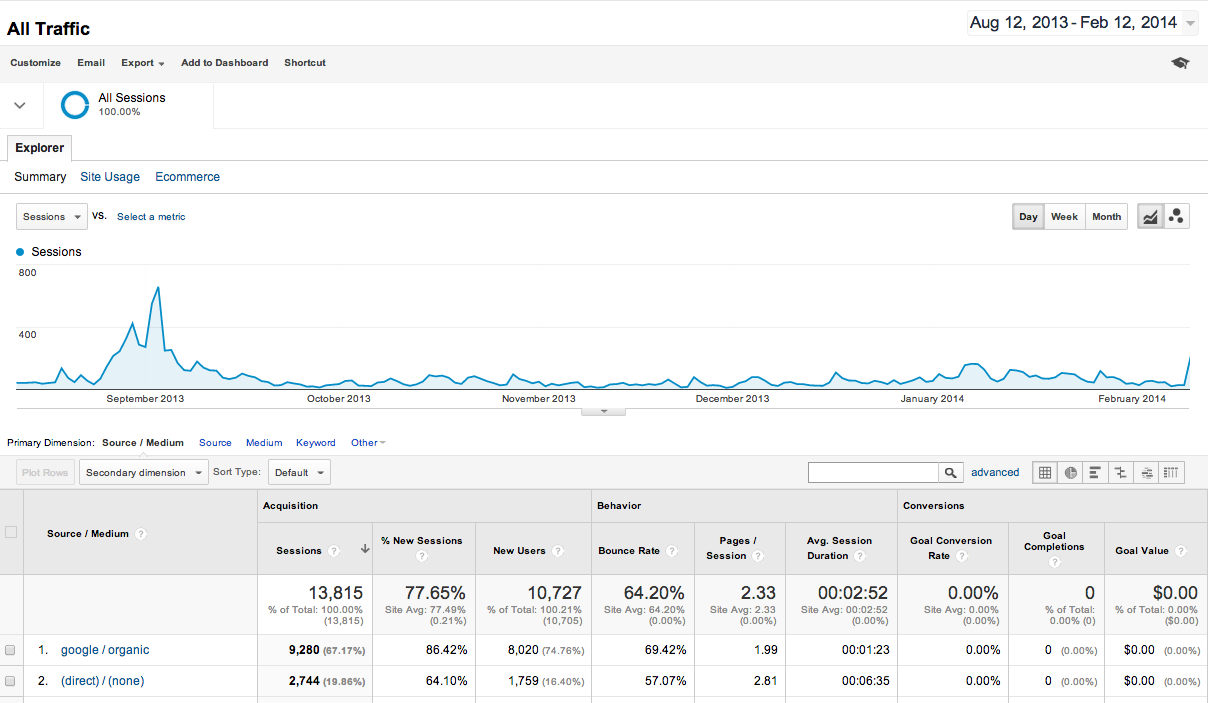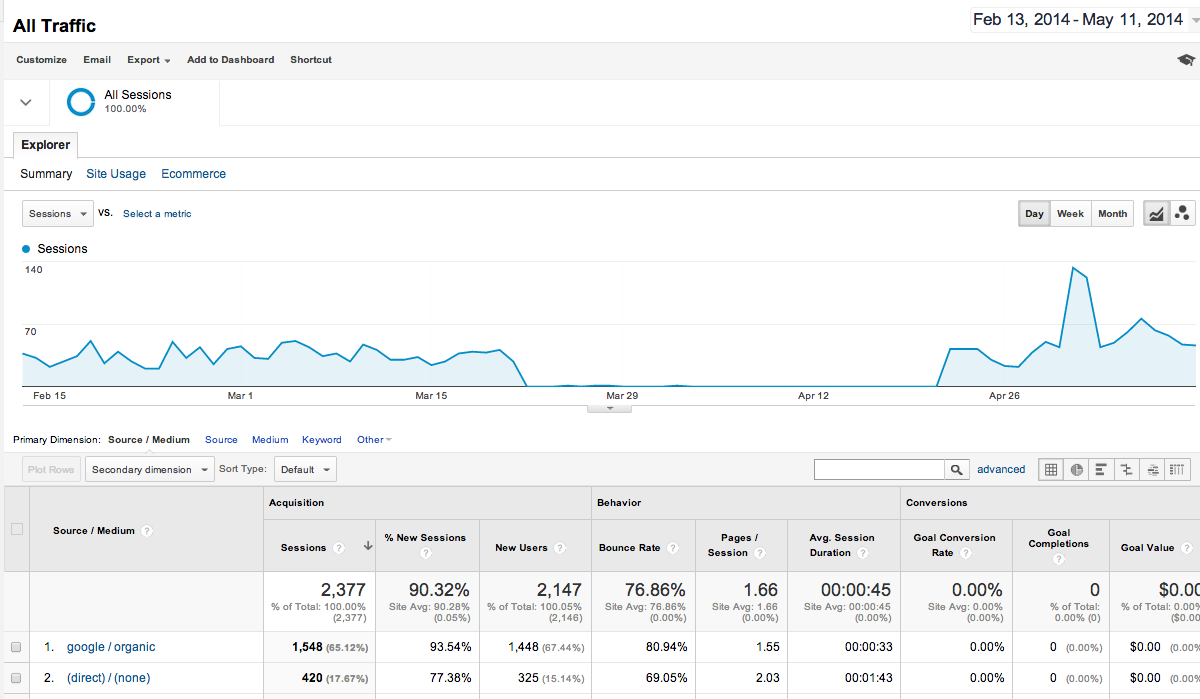SEO or search engine optimization is the method to expose your website to search engines in a way that they recommend it above other websites to people searching for your product(s) or service(s). I am assuming that startups do not have dedicated resources for things like updating social media profiles, writing blog posts, link building or for blogger outreach campaigns for SEO purposes.
The biggest problem that makes SEO for startups a tough nut to crack is learning how to have enough content so that you could tell (pretend at least) search engines that your website possesses a lot of information and thus you deserve more traffic than they think you do. As a startup you need visibility and thus you need to think how to make it happen in a resourceful manner.
I have been there and I am going to share my strategies with you. I will use two case studies to get the point across in a manner that it makes sense for practical implementation.
Note: The pages that you create using these strategies should have decent value for your audience.
SEO for Startups: Bookup Case Study
Bookup was my first startup as a co-founder. If you check the website you will notice that there are only a few pages that can be accessed without logging in. We were thus never listed on any search engine for our primary keywords such as “cheap college textbooks” or “Buy used textbooks”. We simply could not compete with our competitors who are established giants and if Kevin O’leary heard our pitch he would describe us as the cockroaches that we were.
Here is what the traffic looked like for first 6 months of creating Bookup. The spike is from when we shared a link on some social platform.
Google sent us way less traffic than we would expect. As the CTO I wanted to get some organic traffic to our website without spending a lot of resources. It was then when it hit me and I created something that brings us constant traffic even after a few months of downtime. Here are the things I did and I hope you will find something that you could do as well.
Bookup had books and it knew all about those books. It knew who had that book and who was buying it. We knew at what price you could buy or sell it. I decided to create a page for each book with all the information that we can put out about that book. If I executed that correctly, I would have about a million pages without putting a lot of resources into it.
This was also motivated by the fact that while “cheap text books” and “Buy used textbooks” got over 100K searches a month, two average searches for every title we had would mean 2MM searches a month. We could totally create a page that had the potential to rank for that particular ISBN and book title. With that, I created one single page in PHP and this page produced close to 1MM (dynamic) pages on Bookup. Each page was about a book. Look at this page for Accounting information systems book to see how each page looks like.
Every page has a lot of content that we did not have to produce ourselves. We added links to books that were recently added as that helps us recommending more pages to search engines when they crawl one page. We also created pages for every user with a list of books they had or they wanted. Here is what it looked like after that change.
Instead of 217 visits in 6 months, Google alone sent us 9,280 visits. The traffic spike was from someone sharing our blog post on Reddit and YCombinator news. But as you can see most of the visits are from Google.
However, SEO veterans will question if it is long term. Churn and burn SEO techniques, often labeled BlackHat, can get you a spike that goes down when a search engine updates its algorithm. In order to prove how long term is Bookup, I would like you to have a look at the period since February 2014 till today.
We are doing well again. Constant traffic from search engines even after the downtime is a good sign that our clean SEO Strategies are great for long term benefits. Read SaaS SEO Guide Know more about SEO strategies that work. We are still recovering from all the errors that Google found while crawling our website during downtime. I am adding a screenshot of Bookup’s webmaster tool that will show that Google de-indexed a lot of pages from our website and is indexing the site again. As it adds more pages in its index, we should get some more search love. The errors are not current, but we have reduced them from a few hundred to 7 and they disappear in small chunks every now and then.
SEO for Startups: Fan Harvest Case Study
Fan Harvest is one of my newer startups. We started it in February 2014 and by March 2014 we got serious about it as it showed its potential by selling a few subscriptions. Like any MVP, Fan Harvest had the same issue. It is a 3-page website (I am fond of this phrase) with all cool stuff happening behind a login screen. We can’t give search engines access to the stuff behind the login page. Other than that there isn’t much that can be done, or so we believed.
The reason I am writing this post is that I applied the same trick on Fan Harvest last week and it seems Google likes it. We have multiplied our impressions by few folds in only a week and I bet the clicks will follow soon. I will post an update here once we have those numbers. Here is a screenshot of Webmaster Tools that would clarify what I am saying better.
We only had two keywords that we used to appear on searches for. Those were “fan harvest” and “fanharvest” for obvious reasons. Now, we are ranking good for a number of terms. For instance the term “aussie supps bayside” has nothing to do with what Fan Harvest does, but we rank on first page for this term. Let me explain how I implemented my Bookup strategy here.
Fan Harvest lets you analyze any Facebook page to find out their social media strategy. You can identify potential customers who are looking to buy your competitors’ product. You can download a list of these people and show your ads to them to win them over.
What I did was created a page that would take this Facebook page and put interesting analytics about it on a separate fanpage. A good example of a fanpage would be Aussie supps bayside. Notice the section that shows what other pages were liked by people who liked the current page. This feature allows us to link multiple pages internally. This way if a search engine crawler finds one page, it will also find bunch of other pages form our website.
We only added 837 pages, of which so far 476 have been indexed. The impressions went through the roof and as we get more pages the ranks will improve.
How to Implement it?
There is no value in the text I put above if you do not know how to implement it, right?
What you need is a single page that will display this information based on a parameter. For instance, the page that produces the resulting page for a book is called book.php and it takes one parameter that is bookid. The moment it gets that value, it finds everything from the Database and creates the page. There is an “.htaccess” file that rewrites this URL in a way that the user sees the cleaner URL (bookup.co/this-is-the-title-of-the-book-with-this-ISBN) while the system sees the book.php page (bookup.co/book.php?bookid=ISBN).
We then add these cleaner URLs to a Sitemap file that could be added to Google webmaster tools. Google sees these URLs and goes on to crawl them to index them. Now, when someone searches for that ISBN the page with that ISBN in its URL and body appears higher than those sites that merely rank for “cheap college textbooks”. Thus, we steal a lot of traffic from generic book trading websites.
This is not as simple as this article made it sound. However, it is not that difficult that you cannot do it. Start doing it and if you run into problems remember that I am mostly one tweet away http://twitter.com/dinwal. If you have your own cool strategy for SEO, feel free to share it in comments.





Pingback: Why Entrepreneurs NEED multiple Perspectives - Pro Start Me
Interesting although your links don’t work at the moment.
However, one question about the Bookup case. The info you are using about the books is not unique if I understand it correct. Isn’t that a problem in relation to google, or does it work because your “keywords” in this way are the ISBN-numbers and thereby unique in itself? Hope you understand what I mean.
Hi Per,
Thank you for your comment.
The links for FanHarvest are down at the moment due to maintenance. Sorry for the inconvenience.
The information about books can’t be unique, but this has never been a problem for us. I assume search engines understand that one cannot modify the synopsis of a book and hence it won’t change. However, we have a lot of information presented on the page that is unique to a book (such as users who have them etc.). The page is also nicely organized and thus we do ok.
Hope that helps.
– Dinesh
Hey Dinesh Agarwal great write up here I found my way here as I think you favored a tweet I made via @dgdmarketing I will contact you via twitter instead of here talk soon.
Pingback: Anatomy of Good, Winning Hackathon Ideas